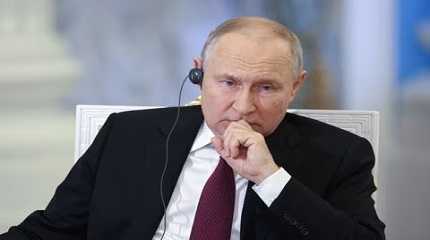
MOSCOW, Oct 16 (Reuters) - Russian President Vladimir Putin entered the fevered diplomatic fray of the Middle East on Monday, speaking to five of the major players including Iran and leading Arab powers in an attempt to secure a ceasefire in the war between Israel and Hamas.
Russia, which has relationships with Iran, Hamas, major Arab powers as well as with the Palestinians and with Israel, has repeatedly said the United States and the West have ignored the need for an independent Palestinian state within 1967 borders.
Putin spoke to Iranian President Ebrahim Raisi and to Syrian President Bashar al-Assad by telephone, the Kremlin said. He also plans to speak to Egyptian President Abdel Fattah al-Sisi, Abbas and Israeli Prime Minister Benjamin Netanyahu, it said.
Russian Deputy Foreign Minister Sergei Ryabkov told Putin that the situation was escalatory, that Israeli army actions were "indiscriminate" and that the risk was that Israel would begin a ground operation against Gaza.
"The threat is high that this whole conflict gets out of control," Ryabkov told Putin at a meeting also attended by Russia's spy chiefs and military leaders.
He said that the United States was ultimately responsible for the crisis due to its failed policy in the Middle East and that Washington was blocking a Russian resolution in the UN Security Council.
Putin, who says the West is seeking to cleave Russia apart by supporting Ukraine, says the current violence in the Middle East shows just how far U.S. policy in the region has failed.
Putin will meet Xi Jinping in China this week in a bid to deepen a partnership forged between the United States' two biggest strategic competitors.
Russia and China, both permanent members of the United Nations Security Council, have said that the fundamental issue at the heart of the conflict is the lack of justice for the Palestinians.
CHINA AND RUSSIA
The Palestinians want a state in the West Bank and Gaza Strip with East Jerusalem as its capital - all territory captured by Israel in the 1967 war.
"We believe that the main thing right now in this situation is to immediately cease the fire and begin the process of a political settlement," Kremlin foreign policy adviser Yuri Ushakov was quoted by state news outlets as saying.
China's foreign minister on Monday called for a ceasefire to halt the bloodshed in Israel, suggesting at a meeting with his Russian counterpart that major world powers should work to avoid a humanitarian disaster.
Russian Foreign Minister Sergei Lavrov discussed the conflict between Israel and Hamas with Chinese Foreign Minister Wang Yi in Beijing ahead of a visit by President Vladimir Putin to China.
"The United Nations Security Council must take action, and the major powers should play an active role," Wang told Lavrov, according to a Chinese transcript of the meeting.
"It is imperative that a ceasefire be put in place, that the two sides be brought back to the negotiating table, and that an emergency humanitarian channel be established to prevent a further humanitarian disaster."




